12+ Best Taiwanese Horror Movies
Taiwan may not produce as many horror movies as some of its East Asian neighbors, but its status as a hotbed of horror is on the rise. Here are a few of the best horror movies from Taiwan.
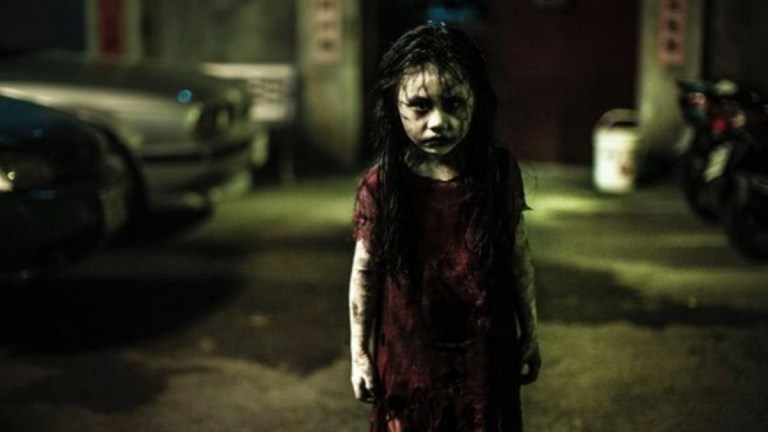
The future of Taiwan’s horror-film industry looks promising. When compared to other East Asian territories like Hong Kong, Japan, and South Korea, Taiwan’s contribution to global horror cinema has always lagged behind. However, since the mid-2010s, movies such as The Tag-Along (2015), Detention (2019), and The Sadness (2021) significantly increased worldwide interest in Taiwanese horror movies.
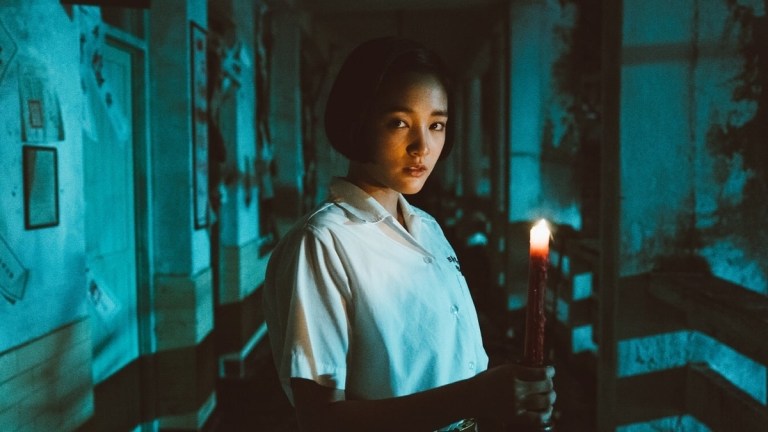
This list chronicles a few of the standout horror movies made in Taiwan. The Taiwanese film industry was strongly linked to the much larger Hong Kong film industry for decades. For this reason, co-productions with other territories are excluded from this list unless they are particularly noteworthy. In that way, hopefully, this list shines a light on how Taiwan’s horror cinema is emerging from the shadows of its East Asian neighbors.
The Best Taiwanese Horror Movies
Double Vision (2002)
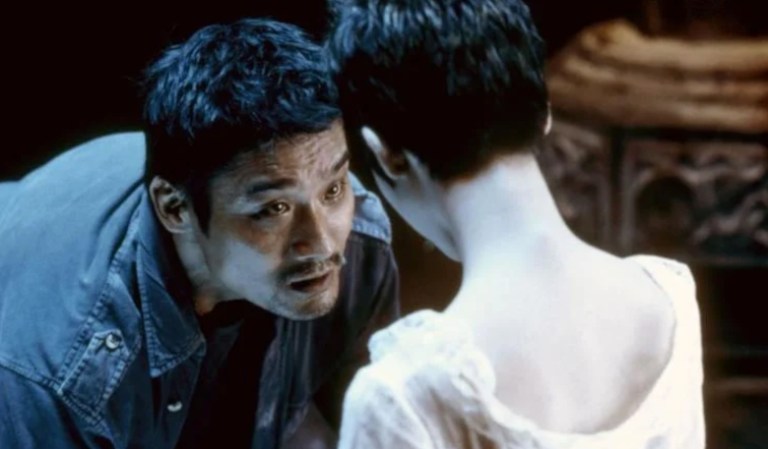
Double Vision is an intriguingly dark crime thriller with an unmistakable American influence. Produced by Columbia Pictures’ Asian branch and directed by the branch’s head at the time, Taiwanese filmmaker Chen Kuo-fu, Double Vision pairs an FBI agent (David Morse) with a disgraced Taiwanese police detective (Tony Leung Ka-fai) to solve a spate of mysterious (and possibly mystical) killings. The movie seems to draw tonal inspirations from American horror/thrillers such as Se7en (1995), but its extensive use of Taiwanese and Chinese mythology and folk religion help make it distinct. Double Vision is surprisingly gory at times, and its supernatural mystery is well developed.
The Heirloom (2005)
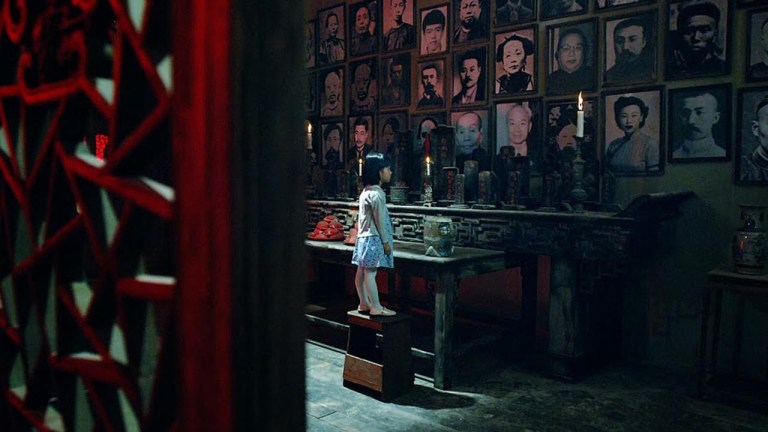
Emphasizing style and mood, The Heirloom is a slow-burn haunted house movie from first-time director Leste Chen. Like many spooky movies from Taiwan, The Heirloom draws on obscure folk practices to create a foundation for supernatural scares (though going into detail about the grisly practice would spoil a large part of the movie). The story in The Heirloom is about a man, James (Jason Chang), who moves back to his family home in Taiwan after living abroad. The house hasn’t been lived in for many years, but frightening occurrences convince James and his girlfriend Yo (Terri Kwan) that it’s not as empty as they expected it to be.
Silk (2006)
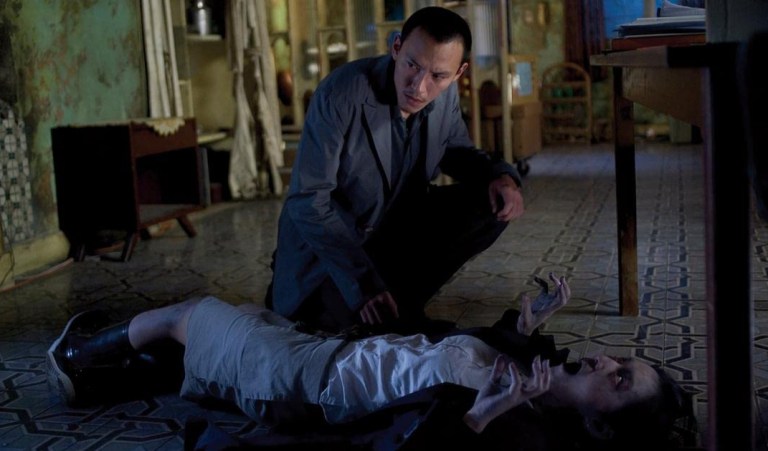
Silk combines science fiction and horror in an interesting take on a movie about paranormal investigators. Japanese star Yosuke Eguchi is Hashimoto, a scientist who develops a device, the Menger Sponge, which can harness energy produced by ghosts. Hashimoto enlists the help of a local police officer (Chang Chen) to help his team learn more about the spirit of a young boy he is using to power the Menger Sponge, but their investigation into the supernatural has dangerous repercussions. Silk relies more on mystery and dread rather than jump scares, so even when the plot starts to wander a bit too much, the chills should keep most viewers hooked.
Soul (2013)
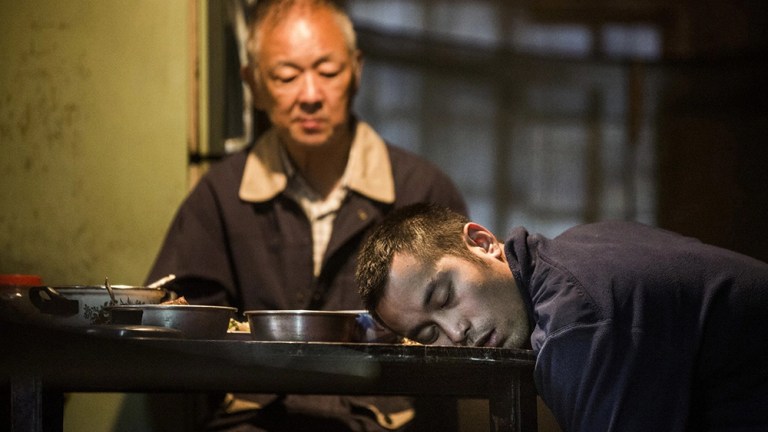
Beautifully shot and wonderfully acted, Soul combines the sub-genres of possession, serial killers, and family drama into one unsettling thriller. A-chuan (Chang Hsiao-chuan) is sent to be cared for by his father Wang (Jimmy Wang Yu) after suffering from unexplained blackouts. While living with his father, A-chuan becomes a murderer. Instead of turning his son in to the police, Wang does what he can to help A-chuan who claims to be possessed by a wandering spirit. The approach to the horror in Soul is in a more arthouse style than any of the other movies on this list, and it is quite beautiful despite its gruesome subject matter.
The Bride (2015)
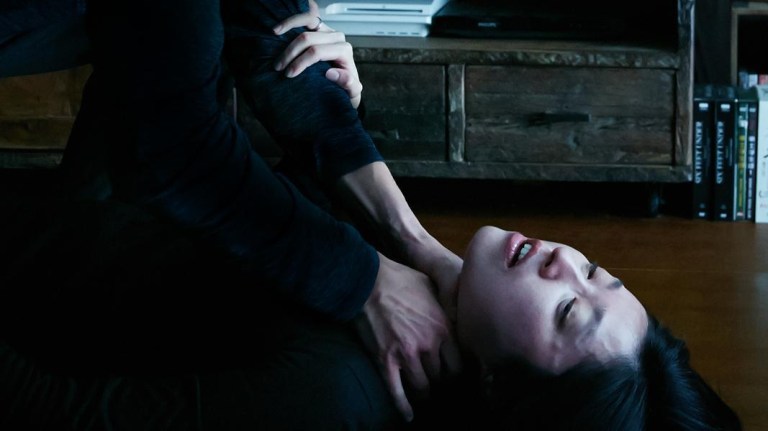
The Bride is an atmospheric supernatural horror movie inspired by the real-life practice of ghost marriages. Liu Cheng-hao (Wu Kang-ren) is ready to settle down and marry his girlfriend (Nikki Hsieh), but Liu begins experiencing terrifying supernatural events. Meanwhile, a sixteen-year-old girl (Vera Yen) who has the ability to see ghosts is haunted by a vengeful female spirit, leading to a finale where dark secrets are revealed. The Bride has been described as a throwback to the boom of Japanese ghost movies (J-horror) that emerged in the late 1990s, and it’s perfect for fans of that style of creepy horror.
The Tag-Along (2015)
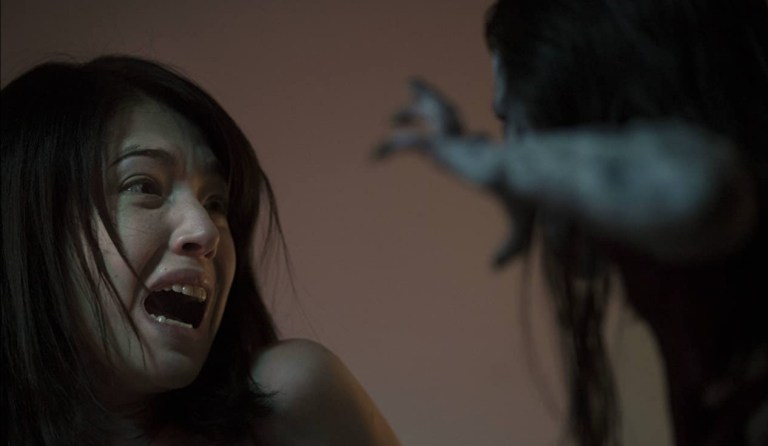
The Tag-Along (also released as The Haunted on DVD) captured the collective imagination of its local audience in Taiwan with its story based on a Taiwanese urban legend. The original title of the movie translates to The Girl in Red, and it is inspired by a “real” video of a creepy little girl wearing red that is supposedly connected to the death of someone else seen in the video. The Tag-Along expands on the urban legend, making the little girl a demonic spirit that gets into people’s heads and tricks them into following her into the woods. The girl’s targets are a young couple (Tiffany Ann Hsu and River Huang) who are having difficulty in their relationship. The Tag-Along is quite creepy throughout much of its runtime, and its emotional story will keep most viewers invested in the characters.
Mon Mon Mon Monsters (2017)
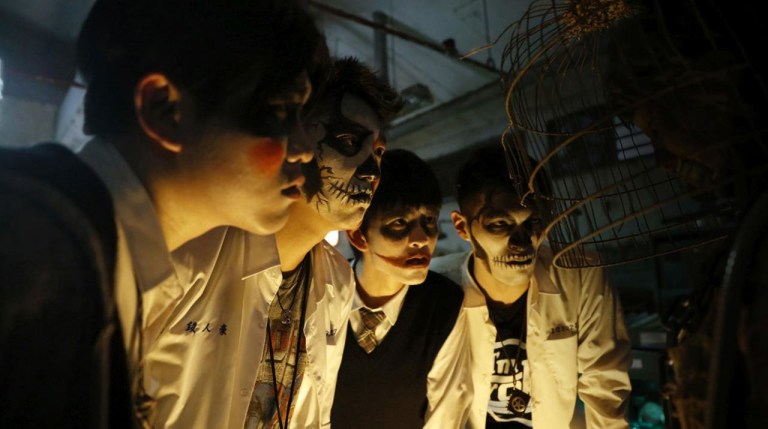
Mon Mon Mon Monsters is a fabulous Taiwanese horror film that explores that the cruelty people are capable of. High-school student Lin Shu-wei (Teng Yu-kai) is the target of bullies, but he forms a tentative truce with his tormentors when they collectively discover a pair of flesh-eating female ghouls. Circumstances lead the the boys kidnapping and imprisoning one of the ghouls, and, upon discovering that the creature has supernatural healing abilities, they mercilessly torture her. Most of the movie focuses on Lin’s struggle to deal with his conflicting emotions stemming from years of being bullied while now being given what appears to be a free pass to be as cruel as he wants to another living being. Mon Mon Mon Monsters is often described as a horror-comedy, but the incredibly dark places the story goes to are more unnerving than funny.
The Tag-Along 2 (2017)

The Tag-Along 2 is a bigger movie than The Tag-Along, but it may not be quite as good as the original. The story follows Shu-fen (Rainie Yang) as she attempts to track down her missing teenage daughter Ya-ting (Ruby Zhan). Ya-ting disappears after her mother discovers she is pregnant, and Shu-fen’s search sets her on a collision course with the demonic little girl in red. The story in this sequel is much more spread out than in the previous movie, with a greater number of characters pulling the plot in various directions. There is also a bigger reliance on digital effects which works quite well at times, but at other times can be somewhat underwhelming. Despite any shortcomings though, the movie is grounded by the performances of Rainie Yang and Ruby Zhan. Also, the continuation of Tiffany Ann Hsu’s story from the original movie is a welcome bonus.
Detention (2019)
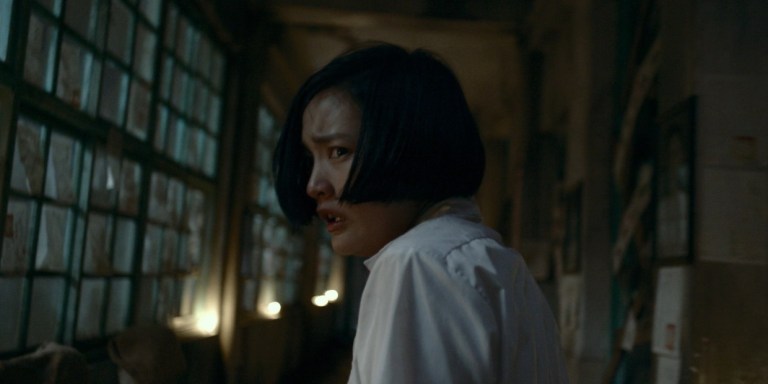
Taking place in 1962 during the decades-long period of political repression and martial law known in Taiwan as the “White Terror,” Detention is a supernatural psychological horror movie set mostly inside a school. Students Wei (Tseng Ching-hua) and Fang (Gingle Wang) find themselves trapped inside the nightmarish version of their school, and they have to piece together how they got there while avoiding the monstrous entities roaming the halls. As the plot twists and turns, viewers discover that the truly frightening aspects of the story are all based in the oppressive reality of the White Terror. Director John Hsu’s Detention is an effective horror film that won numerous awards at the prestigious Golden Horse Awards in 2019.
The Bridge Curse (2020)
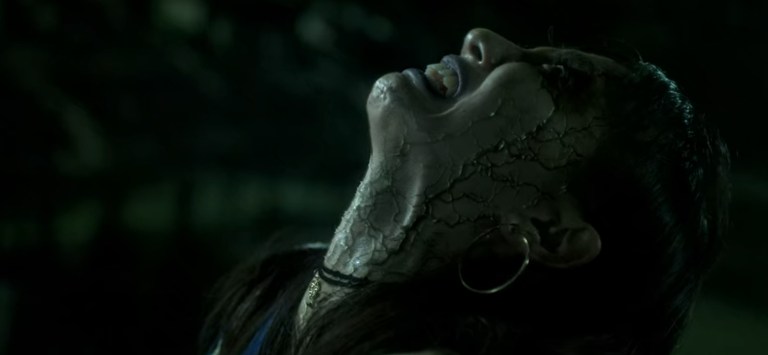
The Bridge Curse is a fun and twisty ghost movie which is supposedly inspired by a true story. The “real” story involves a university student who livestreamed himself on a haunted bridge, only to have his viewers tell him they saw a ghost behind him. The Bridge Curse begins similarly with a group of people recording an attempt to test the urban legend of a haunted bridge that ends at a staircase. At night, an extra step is sometimes added to the staircase, and if certain conditions are met, a ghost will appear. Needless to say, ghostly happenings occur, and the ensuing story is told from differing viewpoints over multiple time periods as the history of the curse is explained.
The Sadness (2021)
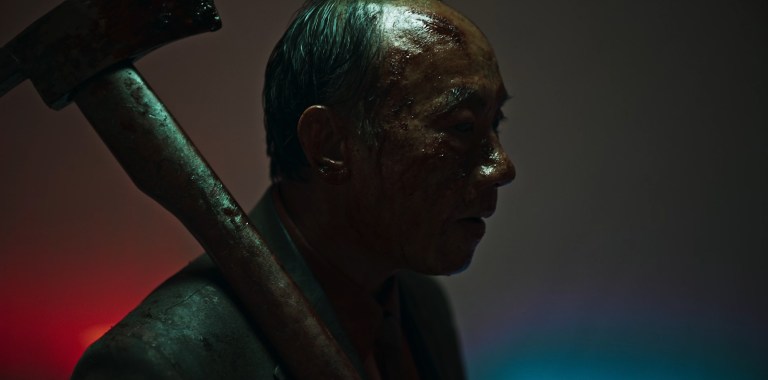
The Sadness is almost certainly Taiwan’s goriest move of all time. The movie stars Regina Lei and Berant Zhu as a couple, Jim and Kat, separated during an outbreak of a virus that turns normal people into crazed murderers and sex maniacs. Jim has a series of disturbing encounters as he treks through the city to find Kat, and Kat does her best to stay alive while being stalked by an infected businessman (Wang Tzu-chiang) who has some unspeakable plans for the beautiful young woman. The Sadness was a hit when it was released on Shudder in 2022, and it could prove to be a movie that, much like Double Vision and The Tag-Along, helps to expand the reach of Taiwan horror movies.
Incantation (2022)
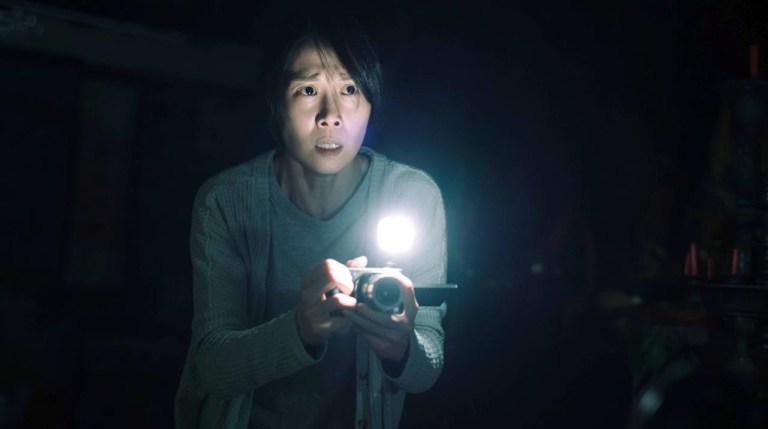
Like many of the more successful Taiwanese horror movies, Incantation takes inspiration from true events and local folklore. Presented in a found-footage style, Incantation follows a mother as she tries to break a curse she received years ago after carelessly desecrating a spiritual ritual. The curse is now affecting the woman’s daughter, making her desperate for a release. Director Kevin Ko’s movie was a hit with Taiwanese audiences. It made NT$170 million (equivalent to about $5.7 million US) at the box office, making Incantation the highest-grossing Taiwanese horror movie ever.
More Entertaining Taiwanese Horror Movies
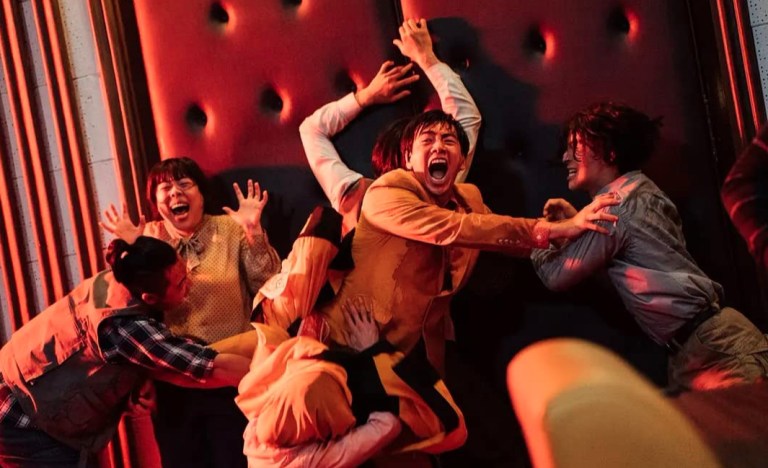
- Wolf Devil Woman (1982) – This is a rather fun and silly movie about a woman raised by wolves seeking revenge on the devil who killed her parents.
- Hello Dracula (1985) – Though it’s made for children, this is a delightful horror comedy featuring jiangshi, otherwise known as Chinese hopping vampires.
- Invitation Only (2009) – Part slasher and part torture-porn with a good amount of gore, this uneven yet fun movie is about an underground party for the ultra-elite that turns into a nightmare for a group of lower-class citizens who don’t belong.
- Zombie Fight Club (2014) – Told in two distinctly different halves, this offbeat action-horror movie features pretty people in various states of undress surviving a zombie outbreak in an apartment building before being forced into gladiator-style zombie battles.
- The Rope Curse (2018) – The plot, about a cursed rope used in a suicide, may not feel completely original, but The Rope Curse is still an entertaining movie.
- The Tag-Along: Devil Fish (2018) – The third Tag-Along movie branches out with a different Taiwanese folktale about a curse brought about by a fish with a human face. The movie stars popular Taiwanese actress Vivian Hsu.
- Get the Hell Out (2020) – A zombie virus spreads in the Taiwanese parliament in this fun and action-packed horror comedy.
- Hospital (2020) – This is a pretty good ghost movie about a Taoist priest and his son who help two women contact deceased loved ones in an old hospital.
A Brief History of Film and Horror Movies in Taiwan
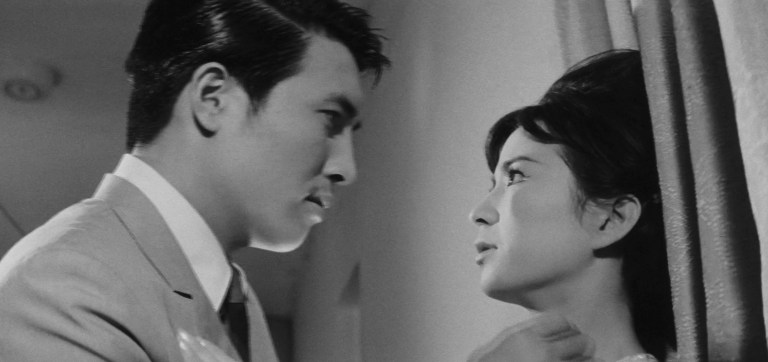
Taiwan’s entire film industry has historically struggled thanks to its politically complicated history. When motion pictures were introduced to Taiwan around 1900, the island was occupied by Japan. Few movies were made in Taiwan until after World War II, and almost all that were made prior to 1945 were Taiwan-Japan co-productions. And of those movies, many were documentaries and propaganda.
China took control of Taiwan after World War II, but it wasn’t long before China instilled martial law on the island. The period of martial law, lasting from 1949 to 1987, more or less coincides with a period of horrific political repression in Taiwan known as the White Terror. So in effect, even though post-war Taiwan saw a surge in locally produced movies, heavy censorship from the ruling Chinese government meant it would be decades before horror became a viable genre to produce in Taiwan.
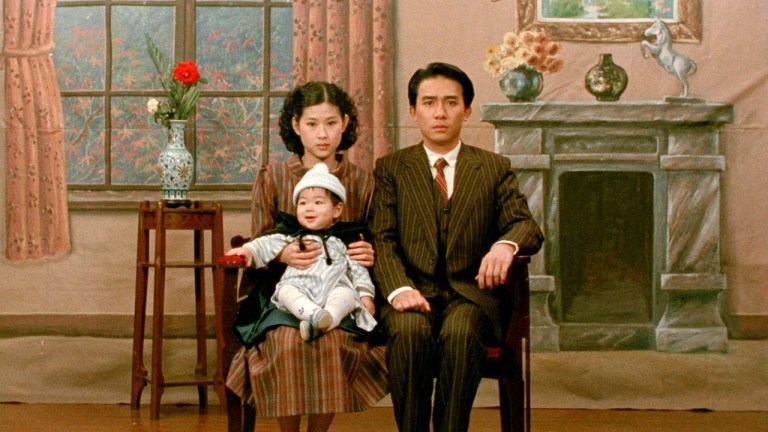
Hong Kong’s prolific film industry dominated Taiwan’s movie-watching public even as home video spread in the 1980s. Around this time, the local government wanted to encourage the growth of the domestic film industry in Taiwan, and it produced the anthology drama In Our Time in 1982. The movie started a wave known as New Taiwanese Cinema that produced remarkable filmmakers including Hou Hsiao-hsien (The Assassin, 2015) and Edward Yang (Taipei Story, 1985). Many of the Taiwanese movies produced during this time were realistic dramas that portrayed everyday life and struggles.
Martial law ended in 1987, and censorship began to relax. A Second New Wave began in Taiwan around 1990, of which Ang Lee (Eat Drink Man Woman, 1994) was a big part. Movies produced in this wave started to gravitate towards more commercial fare. Then, in 2002, the US-backed and Taiwan-made supernatural crime thriller Double Vision finally sparked enthusiastic interest in locally made horror movies. Double Vision wasn’t the first horror movie made in Taiwan, but its combination of Hollywood sleekness and Asian folklore caught people’s attention like no other Taiwanese horror movie before it.
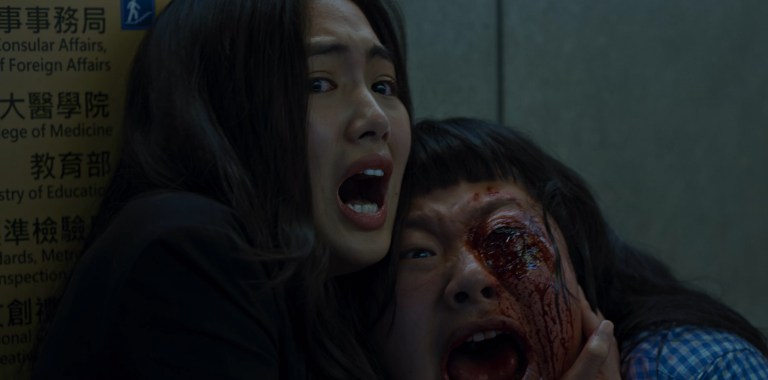
The horror trend continued somewhat sporadically in the following years. Then, more than a decade after Double Vision, The Tag-Along (2015) once again excited Taiwanese audiences with paranormal horror crafted from local legends. The Tag-Along broke box office records in Taiwan, and it set the stage for a new cycle of Taiwanese horror. The wave of horror in Taiwan since 2015 has grown, and with streaming platforms like Shudder and Netflix increasingly making movies like The Sadness (2021) and The Incantation (2022) widely available, Taiwanese horror is beginning to gain the attention of the world.
